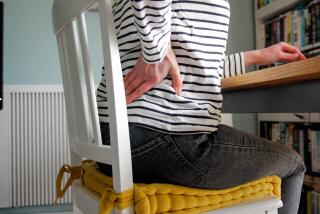Just thinking about math can make your head hurt, study confirms

Does the mere sight of an algebra textbook make your head hurt? Do you feel a throbbing in your temples when you see the waiter approaching with a check and you know you’ll have to divvy up the bill among you and your dining companions – plus calculate a tip?
Plenty of people would rather have a root canal than solve a math problem, but some people have such high levels of math anxiety that just thinking about doing math may cause physical pain, according to a new study.
Math anxiety is “a condition in which the prospect of doing math evokes unpleasant physiological and emotional responses,” as we explained in this story from 2010. Sian Beilock, a psychologist at the University of Chicago, studies the condition along with other aspects of cognitive psychology and education.
Last week, Beilock and her former graduate student, Ian Lyons, published a study that may explain why mere thoughts of math seem to cause physical pain in some people.
The researchers recruited 14 people with high math anxiety and asked them to solve some algebra problems while their brains were being watched by an MRI scanner. Compared with 14 other volunteers who were comfortable with math, the brains of the math-anxious subjects became active in a region called the dorso-posterior insula, or INSp. This part of the brain is known to cause pain when directly stimulated, they reported last week in the journal PLoS ONE.
Scientists already knew that psychological anguish could cause physical pain – parts of the INSp have been shown to become active “during severe social rejection experiences,” such as breaking up with a boyfriend or girlfriend. That kind of pain could certainly extend to the anguish that some feel when doing math.
But in this study, solving math problems wasn’t the most painful part of the experiment.
Lyons and Beilock were surprised to find that their test subjects showed more activity in the INSp portion of the brain – as well as a connected area called the mid-cingulate cortex, or MCC, that is also involved in processing pain – while they waited for the next math problem to appear. And the more a person suffered from math anxiety, the more active the INSp during that waiting period.
But higher levels of math anxiety didn’t translate into “increased pain-related activity” in the brain while actually solving the equations, they reported.
“It is not that math itself hurts,” they concluded. “Rather, merely the anticipation of math is painful.”
You can read the study online here.
Return to the Science Now blog.
Follow me on Twitter @LATkarenkaplan







